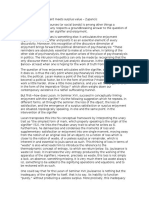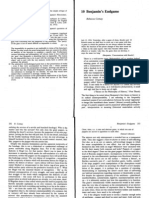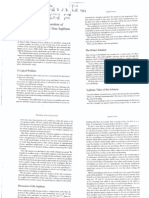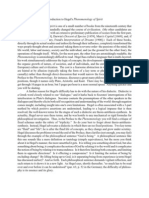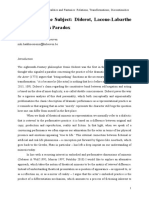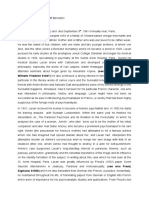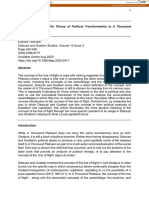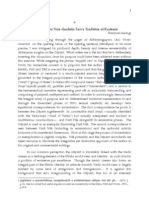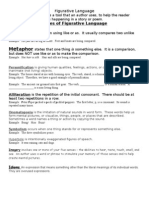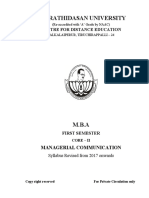Dolar - Nothing Has Changed
Dolar - Nothing Has Changed
Uploaded by
fortyrrCopyright:
Available Formats
Dolar - Nothing Has Changed
Dolar - Nothing Has Changed
Uploaded by
fortyrrOriginal Title
Copyright
Available Formats
Share this document
Did you find this document useful?
Is this content inappropriate?
Copyright:
Available Formats
Dolar - Nothing Has Changed
Dolar - Nothing Has Changed
Uploaded by
fortyrrCopyright:
Available Formats
Filozofski vestnik
Volume/Letnik XXVI Number/tevilka 2 2005 147160
NOTHING HAS CHANGED
Mladen Dolar
In Whoroscope, one of his first published texts, a poem which won a poetry competition in 1930, Beckett aims an elaborate blow at Descartes. There is the philosopher of methodical reduction, the reduction of all supports in the outside world, in perception, in the body, the reduction of all supports to questionable inner certainties, safe traditions and evident truths that unquestioningly rule our lives, the reduction of all contingency and necessity, external and internal, in order to arrive at the minimal point of certainty, the firm rock of cogito, the prop of the subject from which all other props have been taken away. But Beckett approaches the cogito (a word never mentioned in the poem, and neither is Descartes for that matter)1 through its reverse, from the angle of irreducible contingency. Cogito is, so to speak, inserted back into the body from which it emanates and into the haphazard eventualities of historical circumstance. The Cartesian body depends on its trivial tastes (the notorious eggs which had to be hatched from eight to ten days, no shorter and no longer), the Cartesian mind is preoccupied with the trivialities of rivalry with opponents, illustrious (Galileo, Harvey, Arnauld) and obscure (Anna Maria Schurmann, Weulles). Cogito is confronted with the intricate web of trivia, which Beckett assiduously excavated from Adrien Baillets late 17th century life of Descartes. Descartes, we learn in the notes appended at the end (in the manner of T. S. Eliot, and without which we would be quite lost), kept his own birthday to himself so that no astrologer could cast his nativity, but to no avail: Beckett cast his horoscope, his whoroscope, three centuries later, the whoroscope of cogito, providing this bodiless entity with the contingency of its haphazard moment, reversing its reduction, reducing its reduction in the opposite direction,2 expanding
1 But we do find Ren du Perron and Fallor ergo sum. I use Collected Poems in English and French, Grove Press, New York 1977. 2 And also in the opposite direction of the horoscope, the moment of death: and grant me my second / starless inscrutable hour. These are the last two lines of the poem.
147
MLADEN DOLAR
it into a baroque fresco of poignant fleshy detail and overelaborate scholarly references, defying the minimalism of cogitos subjectivity with the maximal expansion of contingency, confronting its clear and distinct reason with its underside of stupidity. Whoroscope has 99 lines, but only because the entries for the competition could not exceed 100 lines. It mentions some twenty names and refers to a dozen historical occasions, in a florid and heavily overladen idiom. Compare this to the first piece of Becketts Mirlitonnades, some half a century later:
En face le pire jusqu ce quil fasse rire
Thats all. The whole poem has the flavour of a slogan, the shortest possible profession de foi, achieved by minimal means: roughly, The worst / into the face / until it / makes us laugh.3 Haiku has the reputation of being the most reduced and economical of poetic forms, 17 syllables in all (5 / 7 / 5), but even this is too much for Beckett: the Japanese are too chatty for him, nine syllables will do, he takes the haiku and cuts it in half. The opposition between the two poems couldnt have been more drastic. It is as if Beckett has accomplished his own Cartesian reduction, the reduction of means and ends, as if to arrive at his own version of cogito, but which in its very minimalism turns out to be the anti-cogito. He strived for anti-cogito in Whoroscope, if one can venture to give this name to his endeavour, but in a way which fell short in its very floridity. The reduction of the reduction of cogito, yielding the contingent, trivial, and historical network in which it was inscribed, was perhaps unwittingly still caught in the workings of cogito, it was but its underside, it was caught in its web precisely due to the maximal distance it tried to establish to it. The proper way to deal with cogito was to take the Cartesian route of reduction, Beckett had to take it onto his shoulders, reduce it to the utmost, to the core, to the minimum, to the bare rock to arrive at what? Nothing? Almost nothing? Its the almost that is the problem. First the language. Whoroscope, as most of Becketts early work, clearly falls under the long shadow of James Joyce. Every detail has a tendency to be overblown, the language is thick with convoluted ramifications, the jokes are too smart, erudite, and studious to be funny, each line is a plunge into encyclopedia. But what defined Becketts subsequent work was precisely a sharp departure from this:
3
This is my own clumsy attempt, since I couldnt find an English version.
148
NOTHING HAS CHANGED
I realised that Joyce had gone as far as he could in the direction of knowing more, [being] in control of ones material. He was always adding to it; you only have to look at his proofs to see that. I realised that my own way was in impoverishment, in lack of knowledge and in taking away, in subtracting rather than adding.4
The art of subtraction (a concept whose fortune was secured by Alain Badiou) vs. the art of addition, the infinitely expandable vs. the infinitely shrinkable.
The more Joyce knew the more he could. Hes tending toward omniscience and omnipotence as an artist. Im working with impotence, ignorance. There seems to be a kind of aesthetic axiom that expression is achievement must be an achievement. My little exploration is that whole zone of being that has been set aside by artists as something unusable as something by definition incompatible with art.5
The art of omnipotence vs. the art of impotence, omniscience vs. ignorance.
With such a program, in my opinion, the latest work of Joyce [Finnegans Wake] has nothing whatever to do. There it seems rather to be a matter of an apotheosis of the word.6
The art of apotheosis, the magic of the word vs. the art of the senselessness, the literature of the non-word, of the drained, barren, porous, meaningless word (as Beckett put it in his famous letter to Axel Kaun, written in German in 1937).
And more and more my own language appears to me like a veil that must be torn apart in order to get at the things (or the Nothingness) behind it. Grammar and Style. [] As we cannot eliminate language all at once, we should at least leave nothing undone that might contribute to its falling into disrepute. To bore one hole after another in it, until what lurks behind it be it something or nothing begins to seep through; I cannot imagine a higher goal for a writer today.7
James Knowlson, Damned to Fame: The Life of Samuel Beckett, Bloomsbury, London 1996, p. 352. 5 Lawrence Graver & Raymond Federman, Samuel Beckett: The Critical Heritage. Routledge and Kegan Paul, London, etc. 1979, p. 148. 6 Samuel Beckett, Disjecta. Miscellaneous Writings and a Dramatic Fragment (ed. Ruby Cohn), Grove Press, New York 1984, p. 172. 7 Ibid.
4
149
MLADEN DOLAR
So the aim of the writer, by definition someone working with words, is to impoverish his means, to undo his tools; if not to entirely eliminate his means of production, then at least to make them work against themselves, to counteract the fascination with words and meaning, to stop producing more and more meaning, but to render the words senseless. Joyces art consisted in producing an overflow of meaning, in making meaning proliferate to the point of its being expanded into infinite floating, a surplus-meaning which can never be pinned down and whose fascination lies in infinite addition, in the possibility of an eternal (n+1), the always expandable excess propelled by enjoyment-in-language. The meaning never to be exhausted, for every surplus produces more surplus, and thus it seems that he has reached the very matrix of production of meaning, and demonstrated it to the point where generations of scholars will have to sweat over the enigmas of his ultimate book for centuries, as Joyce correctly predicted. To be sure, to describe Joyce as the writer of surplus-meaning is also misleading, for what is at stake, in his supreme artistry with words, has only in one part to do with the overflow of meaning, the other part being the overflow of sounds. Language is taken, in one and the same gesture, as a machine for the endless production of meaning and, on the other hand, as a web of infinite sound-echoes, reverberations, words contingently echoing other words and finding a surplus of meaning in the very contingent con-sonances of sounds, in sound contaminations, intersections, cross-cuts, in endless punning. Finnegans Wake can be read as an interminable pun, running for hundreds of pages and convoluted into itself, each pun breeding more pun, the endless text ending in a pun (the notorious and/end) which rejoins its beginning. Thus Joyce ultimately embodies, in a paramount manner, the Lacanian concept of lalangue, this inextricable web of meaning and sound, of the signifier and the enjoyment, where language is neither taken as the matter of the signifier nor simply under the auspices of sound echoes, but precisely through the concept of their very difference, their incommensurability, their split and their union under the same heading, in their very divergence. Hence Lacans own fascination with Joyce, his seeing Joyce as the incarnation of sinthome 8 the word which is itself a pun on symptom (just as lalangue is a pun, for that matter) and which immediately breeds more puns on saint-homme, sinthome madaquin (Saint Thomas dAquin), etc. It seems that Lacan whole-heartedly espoused Joyce as the showcase for a certain line of his teaching. But couldnt one argue that following Becketts way would actually come much closer to the bone of his teaching? This is the argument I will briefly try to pursue here.
8
Jacques Lacan, Le sinthome (Le sminaire XXIII), Seuil, Paris 2005.
150
NOTHING HAS CHANGED
Becketts art, as opposed to Joyces, is the art of (n1). The words have to be deprived of their magic, hollowed (not by conjuring hollow men through their magic, as in Eliot, but by becoming themselves hollow), their meaning has to be subtracted from them so that they become scarce and empty, like senseless sounds,9 reduced to clichs, those dead words within the seemingly living language.10 What has to be explored is how much one can take away from them, how little will make do: the vocabulary has to be contracted, the references reduced to the minimum, the encyclopaedia has to shrivel, the grammar reduced to the bare necessity (what Beckett called the syntax of weakness). What better means to achieve this, on the external level, than to write in a foreign tongue, with diminished powers of expression, voluntarily forsaking the bountiful natural means at ones disposal? To abandon style, to abandon the notorious finding ones own voice that all the courses of creative writing are massively after, to write in a voice which is completely anonymous and impersonal. Not that punning can be entirely avoided, and I can only give one simple example from Ill Seen Ill Said:
Farewell to farewell. Then in that perfect dark foreknell darling sound pip for end begun. First last moment. [] One moment more. One last. Grace to breathe that void. Know happiness.
The pun on the last sentence (know happiness/no happiness) tellingly appears only in Becketts English version, not in the French original (connatre le bonheur) but the fact that for most of Becketts works there are two originals which stem from his hand is itself highly telling. The minimal internal split, the least difference, so much at the heart of Becketts endeavour, is externally translated into the split of two languages, two originals for most of Becketts texts, into the minimal divergence of the two. So even in the shrunken form puns emerge as Becketts reduced words unexpectedly work overtime, constantly doubling themselves in their reduced state.
Cf. e. g. Yes, the words I heard, and heard distinctly, having quite a sensitive ear, were heard a first time, then a second, and often even a third, as pure sounds, free of all meaning [] And the words I uttered myself, and which must nearly always have gone with an effort of the intelligence, were often to me as the buzzing of an insect. (Beckett, Molloy, p. 47) All quotes from Molloy, Malone Dies and The Unnamable are taken from The Beckett Trilogy, Picador, London 1979. 10 But that clich is dead is itself another clich. A clich is a dead piece of language, of which one clich might be that it is dead but wont lie down. Christopher Ricks, Becketts Dying Words, Oxford UP, Oxford 1995, p. 78. Rickss work is one of the best books on Beckett I know of.
9
151
MLADEN DOLAR
One can easily imagine the two writers reading the proofs, Joyce relentlessly adding new twists, and Beckett constantly crossing out words, deleting sentences, paragraphs, pages. For one there is never enough, for the other there is never little enough. Language itself is a veil, that was Becketts insight already in the late thirties, not the locus of true expression, a veil to be pierced, not expanded, not a canvas to paint upon in order to conjure a new infinite universe. Rather, the veil is there only to get behind it, to what seemingly lies beyond. But what lurks behind the veil? Is there not a treacherous illusion in the very supposition of something lurking behind the veil that one should get to? Be it something or nothing, says Beckett, and the oscillation between the two is fundamental. There is no something behind the veil, no thing that one might get to and take hold of by piercing the veil, no thing with any positive features or qualities, no nameable thing, but it is not simply nothing either. The void itself, the nothing, takes on the quality of something without qualities. Piercing the language by reducing words to the function of a minimal split itself arrives at the minimal inner split of something/nothing, an irreducible split where neither of the terms can be taken by itself. There is something that always comes to supplant nothing, yet something only emerges on the verge of nothing, at the limit of being engulfed by it. Along with the reduction of language there is the reduction of the body. Becketts heroes constantly move from mobility to an increasing immobility. The means of transportation fail and are taken away, the legs wont work any longer, the eyes go blind, the body disintegrates, more and more is taken away from it, it is the infinitely shrinkable body in an infinitely shrinkable space. Molloy and Moran are condemned to an increased immobility, Malone is dying confined to a small room, the narrator of The Unnamable has shrunk to a mere voice whose origin remains uncertain. The heroine of Happy Days is buried to her waist in the ground in the first part, then to her neck in the second. Then in Breath, the strangest piece of theatre ever, there is but a mouth, suspended at some height, which breathes in and breathes out, the pure point of emission, not even of a voice in any linguistic or expressive sense, but of a mere breath, the minimal statement possible not a statement, just a pure enunciation. The voice itself can be externalised and estranged from the body, as in Krapps Last Tape, taken over by a gadget, a non-bodily point of emission, or else, more tellingly, there can be the voice without a mouth, as in Texts for Nothing, so that even the existence of a point of emission is suspended. The body is reduced in the same process as words are reduced, it is increasingly mutilated and emaciated, more and more can be taken away from
152
NOTHING HAS CHANGED
it, it is the body on the verge of dying, on the way to disappearance, to the bodily almost-nothing. On the unending way there, the bodily almost-nothing is epitomized by the voice, the voice gradually not of a person or any nameable entity, but an unnameable source of enunciation. The voice at the point of the void, the voice incessantly on the brink of getting lost itself, but nevertheless persevering, tenuously and tenaciously, always recuperating at the very point of vanishing. The reduction of the language and the reduction of the body, they both lead to the voice. After all, the voice is what language and body have in common, it is the point of their intersection, the network of words and meanings has to be underpinned by a point of bodily emission, it is the incongruity of the two that creates their junction, their minimal overlapping, the crossing. It is as if the diminution of the words endows them with a quality which brings them closer to the body, they are reduced to pure voice, that is, the body at its most obstinate when everything else has been removed. They cling to the body in a way that becomes increasingly material, while on the other hand it is as if the flow of words drains the body, it contracts it (in all senses, contraction, contracting a disease, making a contract). There is a mutual and interdependent reduction, a reduction to the point of exhaustion. Exhaustion is something quite other than tiredness, as Deleuze has taught us in his beautiful essay on Beckett, although Becketts hero is also always tired to the point of death. Being tired implies he is not able to realize the possible, but the point is that he exhausts himself in exhausting the possible, and vice-versa. He exhausts that which, in the possible, is not realized.11 It is not that the possible is not realized, it is the possible itself that is exhausted, and the exhaustion of the possible is what is at stake in all Becketts later work. Taking up another of Deleuzes cues, one could say that the reduction of meaning immediately leads to the production of sense (the sense as used in The Logic of Sense). The less there is meaning, the more sense is produced, from one sentence to another, out of nothing, of almost nothing, with useless remains, vestiges, residues of what once was meaning. So it is an absurdity to take Beckett under the heading of the literature of the absurd the reduction of meaning can appear as absurd only by the yardstick of the lost meaning, but the point is precisely to be rid of this yardstick so that sense can be made. The two tramps in Godot quite literally and relentlessly make sense. But this is just an aside. The voice implies a body, a bodily point of emission and a bodily point of reception, but its location is uncertain.
11 Gilles Deleuze, The Exhausted, in: Essays Critical and Clinical, University of Minnesota Press, Minneapolis 1997, p. 152.
153
MLADEN DOLAR
I shall transmit the words as received, by the ear, or roared through a trumpet into the arsehole, in all their purity, and in the same order, as far as possible. This infinitesimal lag, between arrival and departure, this trifling delay in evacuation, is all I have to worry about.12
The bodily apertures are interchangeable, the mouth, the anus, the ear communicate immediately, it is not a question of their location, they become all-one, just the question of a time-lag between arrival and departure; words are received and then retransmitted13 through the orifices, or not even that.
Yes, my mouth, but there it is, I wont open it, I have no mouth, and what about it, Ill grow one, a little hole at first, then wider and wider, deeper and deeper, the air will gush into me, and out a second later, howling. do I feel an ear, frankly now, do I feel an ear, well frankly now I dont, so much the worse, I dont feel an ear either, this is awful, make an effort, I must feel something 14
The orifices are not only interchangeable, but utterly uncertain, not only their location, but their very existence is questionable, the reception and transmission are on the verge of collapsing, yet the very fact that there is a voice, a voice which goes on and on, retransmitting words received, or at least their remnants and crumbs, devouring and vomiting words this fact implies an opening, an opening as such, the juncture of language and body as an opening, although it may always also appear as a closure, a closed and shrinking world with no way out. An opening at the very point of the total closure. Where is the voice coming from, this pure voice of enunciation? Is it a monologue someone is proffering to anybody who might be listening? A bon entendeur salut? Or is it going on in the head, the interminable rambling of an internal voice? The alternative is itself faulty, the point of enunciation cannot be sorted out in that way, it cannot be placed on either side of this roughest of divides.
Beckett, The Unnamable, p. 321. Saying is inventing. Wrong, very rightly wrong. You invent nothing, you think you are inventing, you think you are escaping, and all you do is stammer out your lesson, the remnants of a pensum one day got by heart and long forgotten, life without tears, as it is wept. (Beckett, Molloy, p. 31.) 14 Beckett, The Unnamable, pp. 353, 352.
12 13
154
NOTHING HAS CHANGED
Ill have said it, without a mouth Ill have said it, Ill have said it inside me, then in the same breath outside me, perhaps thats what I feel, an outside and an inside and me in the middle, perhaps thats what I am, the thing that divides the world in two, on the one side the outside, on the other the inside, that can be as thin as foil, Im neither one side nor the other, Im in the middle, Im the partition, Ive two surfaces and no thickness, perhaps thats what I feel, myself vibrating, Im the tympanum, on the one hand the mind, on the other the world, I dont belong to either 15
One couldnt be more precise: the enunciating voice is the very principle of division, itself not on either side and yet on both sides at once, at the intersection of the inner and the outer, and unplaceable in that division, the thinnest of foils which connects and separates the two. Becketts literature, written as literature is, is at the same time the literature of the voice as no other, not only by virtue of it being close to the spoken idiom, but by being sustained merely by pure enunciation which propels it forward, the voice of enunciation with no other hold or footing, the voice more important than the words it utters. For the words are hollow, contradictory, clueless, digressing the flow of words is a constant digression without the main line, without a course, its course is a dis-course, its only course is the voice undermining itself, yet carrying on. This is not a literature of sentences and statements, the statements are trivial, they are not propelled by a will to express,16 they contradict and retract themselves, they keep getting lost,17 and what emerges through all this is a literature of pure enunciation. There is a traditional way of dealing with the inner voice under the heading of the stream of consciousness. The term, stemming from William Jamess Principles of Psychology (1890), was widely applied first to Williams brother, then to Joyce, to Woolf, and a number of others, thus becoming
Ibid., p. 352. Not to want to say, not to know what you want to say, not to be able to say what you think you want to say, and never to stop saying, or hardly ever, that is the thing to keep in mind, even in the heat of composition. (Beckett, Molloy, p. 27.) 17 Cf. e. g. Is there then no hope? Good gracious, no heavens, what an idea! Just a faint one perhaps, but which will never serve. (Beckett, The Unnamable, p. 336.) and so depart, towards my brethren, no, none of that, no brethren, thats right, take it back And would it not suffice, without any change in the structure of the thing as it now stands, as it always stood, without a mouth being opened at the place which even pain could never line, would it not suffice to, to what, the thread is lost, no matter, heres another (p. 252.) There is a whole rhetoric of retraction in Beckett, the constant attempt to take back, make the said unsaid, but obviously this only makes the insistence of enunciation more tenacious.
15 16
155
MLADEN DOLAR
like a trade-mark of the modernist novel. As far as Beckett is concerned, the term is highly misleading and inappropriate. For the stream of consciousness presupposes consciousness as a realm neatly separate from the outside world, and the writer supposedly follows its inner ramblings and faithfully records them as a scribe, just putting down its meanderings in a raw form as they appear to consciousness before being made presentable and coherent. The whole point with Beckett is that this inner voice maintains itself as unplaceable, at the very edge of the mind and the world, the speech and the body, cutting into both and being cut by both. Its inner split immediately translates into an outer split, and vice versa. It is not that consciousness is incoherent, rather the very line that separates consciousness and constitutes it as such is constantly blurred and indistinct. The voice is a pure enunciation without a subject, or one could say, an enunciation in search of a subject. Various modes and levels of enunciation are constantly mixed, heterogeneous voices are inserted, all this without hierarchy and usual punctuation, in a flux which relentlessly implies subjectivation, but without defining its subject, except as sheer perseverance. The subject is precisely unnameable, and the multitude of diverse subjectivities which flock together in the flow are just so many aborted attempts, pursued for a while then abandoned in the middle, suspended. Neither consciousness nor the subject, rather a process of constant subjectivation without a subject. The voice is the anti-cogito. It doesnt make sense, it rambles in all directions, the directions taken are revoked and others are taken, haphazardly. This is not clear and distinct reasoning, quite the opposite, it is the art of the indistinct. The distinctions are made and erased in the same gesture.
But it is gone clean out of my head, my little private idea. No matter, I have just had another. Perhaps it is the same one back again, ideas are so alike, when you get to know them. Its vague, life and death.18
The indistinct rules,19 the usual distinctions, the seemingly most massive and self-evident ones, get blurred and vague, the line life/death is obscured
Beckett, Malone Dies, pp. 207, 206. coming to the truth of being requires to think the non-separate, the in-distinct. But what separates and distinguishes, e.g. light from darkness, constitutes rather the place of non-being and of the false. Alain Badiou, Lcriture du gnrique: Samuel Beckett, in: Conditions, Seuil, Paris 1992, p. 335.
18 19
156
NOTHING HAS CHANGED
and confused no less than the inner/outer divide. But it is the indistinct that opens the space for a minimal difference, a tiny split, which is something other, and far less obvious and dramatic than distinction. It lacks distinction, so to speak, it paints grey on grey, to use Hegels words, which curiously recur in Beckett.20 But not only the clear and the distinct, the rock of cogito is irretrievably rocked at the very opening of The Unnamable, in the justly famous first lines: Where now? Who now? When now? Unquestioning. I, say I. Unbelieving. Questions, hypotheses, call them that. Keep going, going on, call that going, call that on.21 The French original is more poignant and precise at the crucial point: Dire je. Sans le penser. It is not a question of belief, but of thought, of dissociating the I from thinking. Say I. Without thinking it. Say ego, without cogito. It is an I which doesnt give support to thought, an unthinking I, an I without substance, apart from the mere going on. I is the vehicle of perseverance, not the demarcation of the subject, it is the place of the impersonal and anonymous, unnameable subjectivation on the verge of vanishing and resurrecting from the void. I doesnt think, but speaks, and exists only as long as it goes on talking. Or does it? Is existence the proper term to describe its status? Doesnt the endless talking preclude ever saying therefore I am? Isnt there a being quite different from existence, a locus of being without qualities? How can talking ever come to an end? The fact that it doesnt, that it is endlessly propelled forward by the thrust of sheer persistence, is closely connected to its loss of meaning. Not only is it not meaning which drives it on, nor the search for some lost meaning, but also the thrust of continuation prevents the retroactive recuperation of meaning.
Its an uninterrupted flow, of words and of tears. [] I confuse them, words and tears, my words are my tears, my eyes my mouth. [] its always the same murmur, streaming, without a break, like a single word with no end and therefore with no meaning [sans signification], for its the end which gives it, the meaning to words.22
20 E. g. Traces fouillis signes sans sens gris ple presque blanc sur blanc. Bing, in: Ttes-Mortes, Minuit, Paris 1992, p. 62, and much more along these lines. [Muddled traces signs without sense pale grey almost white on white.] It is the literary equivalent of Malevichs White Square on White Surface, that epitome of subtraction and minimal difference. 21 Beckett, The Unnamable, p. 267. 22 Samuel Beckett, Nouvelles et Textes pour rien, Minuit, Paris 1955, p. 1678. The translation is again my own clumsy effort.
157
MLADEN DOLAR
Ultimately, meaning is produced retroactively, it is the end which endows the preceding element with a meaning, the provisional ending of a sentence, of a section, the final ending of the book, it is always the last element which reshapes the preceding ones and makes them tend toward that end, in both senses. It totalises what went before, it makes it a whole where meaning can dwell. The words retroactively become teleological, flowing towards their end/goal, which reclaims them, salvaging their haphazard and tentative advance with a hindsight seal. This is what Lacans concept of point de capiton, the suture point, tries to account for. But with an unending flow no such point is ever reached, the point de capiton seems to be infinitely deferred and suspended, it is not a journey towards some end which would recover meaning. And if the novel has to end at some point, then the last novel of the great Trilogy ends on Ill go on, on the endlessness of going on, the impossibility to end.23 How can talking ever come to an end? With the correlative reduction of words and bodies the question can immediately be extended to How can body ever come to an end? How can life ever come to an end? Indeed Becketts heroes are always and increasingly on the brink of death, they keep dying through whole novels and theatre pieces, waiting for death to come as a salvation, they are all heroes who have come to the end of their journey, who have exhausted the possible, and yet they never die. They start at the point of the end of their journey, at the point where some point de capiton should make sense of their lives, but the end is endlessly receding, it seems that death would rescue them and that this is all they wish for, but in the space of the withdrawing end there is a time-loop, they are caught in a loop which is at the same time the opening of a space, of a sense without any meaning, they reach a rock, which however is not the firm rock of cogito, but rather a being on the verge of nothing, they enter into a space of immortality which provides all the salvation needed precisely at the point where there seemed to be a pure nothing to engulf them. The reduction of words, meanings, bodies, their utter fragmentation leads to a nothing, but nothing is but a loop which keeps them going on, nothing is but an event horizon, on the edge of the black hole, in which objects emerge, the minimal object, the least. Least. Least best worse. Least never to be naught. Never to naught be brought. Never by naught be nulled. Unnullable least.24
The Unnamable, p. 382. The famous ending would require a much lengthier comment. 24 Samuel Beckett, Worstward Ho, Grove Press, New York 1983, p. 32.
23
158
NOTHING HAS CHANGED
Immortality is not the good word for this situation, it reeks of damnation and redemption, a more appropriate and less distinguished word is called for. One of the interpreters says of Becketts hero: Not able to be immortal, he is increvable! [ dfaut dtre immortel, il est increvable!] 25 Increvable, an excellent Beckettian word, hardly translatable into English.26 The dictionary offers to kick the bucket as a trivial expression for dying, so could one say unbucketable? Could one say unbeckettable? He is not immortal, he just cant kick the bucket. As another interpreter put it: the resurrection with Beckett doesnt open any longer on eternal life but on an interminable necessity to continue in a parody of immortality. It is a lay resurrection (laque, nonreligious).27 This is where one could use another, albeit highly laden, psychoanalytic word, the death drive. For the death drive is not simply a drive towards death, rather quite the opposite, despite some confusion in Freud. It is a drive which itself cannot die. It is a pure thrust of persistence which cannot be annihilated, 28 it can merely be destroyed from outside, a pure life in the loop of death, emerging on the verge of nothing. The reduction of words and of bodies thus runs into the realm of the death drive, impelled by the unnullable least that cannot be reduced and which glimmers on the edge of nothing. And this is where Beckett is the greatest answer to the massive debate about nihilism: nihilism is defeated not by clinging to meanings, values, ethical injunctions, creeds, beliefs, world-views, religions, art, hope , it is overcome at the point of reducing all those to the point of facing the pure nothing (en face / le pire), where nothing emerges as a mere loop of unnullable least, a source of new life, a support of perseverance (could one say, the ethics of the death drive?), an opening of a new production of sense. So nothing has changed. The double meaning of this sentence invokes on the one hand the claustrophobic and static setting of Becketts writing, a site where seemingly nothing could ever change already since the first sentence of his first novel, the justly famous incipit of Murphy: The sun shone, having no alternative, on the nothing new. No alternative, nothing new un25 Alfred Simon, Samuel Beckett, Belfond, Paris 1963, p. 130. Simon goes on: Through the vibration of time he goes towards his death which he never joins, yet carrying it in him. 26 Used by Alain Badiou in the subtitle of his luminous book on Beckett: Beckett. Lincrevable dsir, Hachette, Paris 1995. 27 Evelyne Grossman, Lesthtique de Beckett, Sedes, Paris 1998, pp. 69, 117. 28 This is where my reading sharply differs from Badious, who sees in the death drive merely a morbid preoccupation with death.
159
MLADEN DOLAR
der the sun, from the first sentence on. But on the other hand, nothing has changed, it has changed imperceptibly as we went on, following the erratic and unfocused narrating voice in its chaotic meanderings, it has appeared, almost without our noticing, that the nothing is the new in the nothing new on which the sun shines without alternative. And that nothing has changed, glimmeringly in the last half century, to the point that it has left behind the horizon of nihilism, if we are willing to pursue it far enough.
160
You might also like
- Three Books of Occult Philosophy - Henry Cornelius Agrippa (Donald Tyson Edition) (1 Ebook - PDF)Document996 pagesThree Books of Occult Philosophy - Henry Cornelius Agrippa (Donald Tyson Edition) (1 Ebook - PDF)Cm77797% (31)
- Debord, PanegyricDocument4 pagesDebord, PanegyricjczenkoanNo ratings yet
- When Surplus Enjoyment Meets Surplus ValueDocument4 pagesWhen Surplus Enjoyment Meets Surplus ValueMaximiliano CosentinoNo ratings yet
- 39 Laclau With Lacan: Comments On The Relation Between Discourse Theory and Lacanian PsychoanalysisDocument24 pages39 Laclau With Lacan: Comments On The Relation Between Discourse Theory and Lacanian PsychoanalysisRicardo Laleff Ilieff100% (1)
- Lefebvre, Lacan and The Production of Space: Derek GregoryDocument30 pagesLefebvre, Lacan and The Production of Space: Derek GregoryDiego RoldánNo ratings yet
- Time, Space, Forced Movement and The Death-Drive Reading Proust With DeleuzeDocument36 pagesTime, Space, Forced Movement and The Death-Drive Reading Proust With DeleuzeFabio GomesNo ratings yet
- O'Grady - Aquinas & NagarjunaDocument17 pagesO'Grady - Aquinas & NagarjunafortyrrNo ratings yet
- Problematic Aspects of The Sexual Rituals of The Bauls of BengalDocument46 pagesProblematic Aspects of The Sexual Rituals of The Bauls of BengalcontemplativeNo ratings yet
- Civil Procedure Syllabus (2016)Document14 pagesCivil Procedure Syllabus (2016)Czara Dy100% (1)
- Aura Kilner Screen 00 B OddDocument82 pagesAura Kilner Screen 00 B OddRM100% (2)
- Tabish Ur Rehman - Updated Resume - 2018Document6 pagesTabish Ur Rehman - Updated Resume - 2018Tabish Ur Rehman khan KhattakNo ratings yet
- Calum NeillDocument5 pagesCalum NeillboyowitzNo ratings yet
- Marx Critique of Hegels Philosophy of RightDocument125 pagesMarx Critique of Hegels Philosophy of RightCommunist PartyNo ratings yet
- Alain Badiou, HegelDocument9 pagesAlain Badiou, HegelOxanaTimofeevaNo ratings yet
- Lacan and Freud Repetition Repression RegressionDocument3 pagesLacan and Freud Repetition Repression RegressionvladaalisterNo ratings yet
- Lacanian Approach To Problems of Affect and Anxiety in Psychoanalysis PDFDocument30 pagesLacanian Approach To Problems of Affect and Anxiety in Psychoanalysis PDFAngel HsiehNo ratings yet
- Michael Downs - Lacan's Concept of The Object-Cause of Desire (Objet Petit A)Document23 pagesMichael Downs - Lacan's Concept of The Object-Cause of Desire (Objet Petit A)JustinWagnerNo ratings yet
- ToddDocument11 pagesToddAnonymous gitX9eu3pNo ratings yet
- How To Read LacanDocument3 pagesHow To Read LacanNaleendra Weerapitiya100% (1)
- Jacques Lacan "The Instance of The Letter in The Unconscious, or Reason Since Freud" (1957)Document2 pagesJacques Lacan "The Instance of The Letter in The Unconscious, or Reason Since Freud" (1957)Aravind KazakNo ratings yet
- Plato's Republic, by Alain BadiouDocument22 pagesPlato's Republic, by Alain BadiouColumbia University Press100% (1)
- Ragland-Sullivan (1990) - 'Lacan's Seminars On James Joyce - Writing As Symptom and 'Singular Solution''Document20 pagesRagland-Sullivan (1990) - 'Lacan's Seminars On James Joyce - Writing As Symptom and 'Singular Solution''MikeNo ratings yet
- Lacan, Jacques - Kant With Sade, (1989) 51 October 55Document21 pagesLacan, Jacques - Kant With Sade, (1989) 51 October 55ignoramus83No ratings yet
- Foucault Versus Freud On Sexuality andDocument13 pagesFoucault Versus Freud On Sexuality andBadarNo ratings yet
- Bataille, Georges. Toward Real RevolutionDocument11 pagesBataille, Georges. Toward Real Revolutionmarc.a.martins6667No ratings yet
- Power of The Invisible by Mladen DolarDocument12 pagesPower of The Invisible by Mladen DolarnafizaksehirliNo ratings yet
- Rebecca Comay - Benjamin's EndgameDocument21 pagesRebecca Comay - Benjamin's EndgamehuobristNo ratings yet
- Troubles With LacanDocument23 pagesTroubles With Lacanavant_garde216No ratings yet
- Bruno Bosteels - Force A Nonlaw Alain Badiou's Theory of JusticeDocument22 pagesBruno Bosteels - Force A Nonlaw Alain Badiou's Theory of JusticemanpjcpNo ratings yet
- 13 Johnston CapitalDocument77 pages13 Johnston Capitaltomil.hoNo ratings yet
- Radostin Kaloianov Hegel, Kojeve and LacanDocument59 pagesRadostin Kaloianov Hegel, Kojeve and LacanEdgar LorimarNo ratings yet
- Slavoj Zizek Master Class On Jacques LacanDocument1 pageSlavoj Zizek Master Class On Jacques LacanzizekNo ratings yet
- Notes On Hegel's Shorter LogicDocument13 pagesNotes On Hegel's Shorter LogicShaun PoustNo ratings yet
- Mark G. E. Kelly - Against Prophecy and Utopia. Foucault and The FutureDocument15 pagesMark G. E. Kelly - Against Prophecy and Utopia. Foucault and The FutureJosip CmrečnjakNo ratings yet
- Lacan VIDocument435 pagesLacan VIjoshimesNo ratings yet
- Review Badiou HappinessDocument7 pagesReview Badiou HappinessArashBKNo ratings yet
- Becoming Multitude: The AnomalistDocument10 pagesBecoming Multitude: The AnomalistAlberto AltésNo ratings yet
- Alienation and CynicismDocument20 pagesAlienation and CynicismAnyaHajiyevNo ratings yet
- On Diaspora: Christianity, Religion, and SecularityFrom EverandOn Diaspora: Christianity, Religion, and SecularityNo ratings yet
- Zizek - Lacan's Four DiscoursesDocument12 pagesZizek - Lacan's Four DiscoursesCibele GugelNo ratings yet
- Eduardo Pellejero, Politics of Involution PDFDocument11 pagesEduardo Pellejero, Politics of Involution PDFEduardo PellejeroNo ratings yet
- Lacan - Logical TimeDocument10 pagesLacan - Logical Timesadeqrahimi100% (1)
- S Summary of Seminar Xi Cormac Gallagher 1Document17 pagesS Summary of Seminar Xi Cormac Gallagher 1Gabriel KaufmannNo ratings yet
- (Centre For Freudian Analysis and Research Library) Luis Izcovich - The Marks of A Psychoanalysis-Karnac Books (2017)Document299 pages(Centre For Freudian Analysis and Research Library) Luis Izcovich - The Marks of A Psychoanalysis-Karnac Books (2017)hugoarceNo ratings yet
- Adrian Johnston Turning The SciencesDocument33 pagesAdrian Johnston Turning The SciencesMarie Langer100% (1)
- A. Johnston - Naturalism and Anti NaturalismDocument47 pagesA. Johnston - Naturalism and Anti NaturalismaguiaradNo ratings yet
- AJ Hallward ReviewDocument7 pagesAJ Hallward ReviewRichard G. KleinNo ratings yet
- New Theorists of The DialecticDocument6 pagesNew Theorists of The DialecticzizekNo ratings yet
- The Idea of Communism 2: The New York ConferenceDocument211 pagesThe Idea of Communism 2: The New York ConferenceGabrielGauny100% (1)
- (Diaeresis) Matthew Flisfeder - Algorithmic Desire - Toward A New Structuralist Theory of Social Media-Northwestern University Press (2021)Document243 pages(Diaeresis) Matthew Flisfeder - Algorithmic Desire - Toward A New Structuralist Theory of Social Media-Northwestern University Press (2021)ayca berna100% (1)
- The Comedy of Philosophy Bataille Derrida and HegelDocument15 pagesThe Comedy of Philosophy Bataille Derrida and HegelKoutsoupis100% (1)
- NOV 19 - Copjec - May 68Document12 pagesNOV 19 - Copjec - May 68CarolinaMitrovNo ratings yet
- Phenomenology of Spirit Is One of A Small Number of Books From The Nineteenth Century ThatDocument3 pagesPhenomenology of Spirit Is One of A Small Number of Books From The Nineteenth Century ThatBenjamin Seet100% (1)
- Phantoming The Subject Diderot Lacoue-LaDocument7 pagesPhantoming The Subject Diderot Lacoue-LaBernardo JeanNo ratings yet
- August Ruhs / Jeanne Wolff Bernstein Jacques LacanDocument12 pagesAugust Ruhs / Jeanne Wolff Bernstein Jacques LacanmeNo ratings yet
- Lacan On EngleshDocument37 pagesLacan On Englesharica82No ratings yet
- Benedetto CroceDocument16 pagesBenedetto CroceKrstevski AnetaNo ratings yet
- Laclou and ZizekDocument173 pagesLaclou and ZizekyakarNo ratings yet
- On Lines of FlightDocument20 pagesOn Lines of FlightlukasNo ratings yet
- Death and Mastery: Psychoanalytic Drive Theory and the Subject of Late CapitalismFrom EverandDeath and Mastery: Psychoanalytic Drive Theory and the Subject of Late CapitalismNo ratings yet
- The Specter of Democracy: What Marx and Marxists Haven't Understood and WhyFrom EverandThe Specter of Democracy: What Marx and Marxists Haven't Understood and WhyNo ratings yet
- Cut of the Real: Subjectivity in Poststructuralist PhilosophyFrom EverandCut of the Real: Subjectivity in Poststructuralist PhilosophyNo ratings yet
- The Quest for a 'National' Nationalism: E.J. Pratt’s Epic Ambition, ‘Race’ Consciousness, and the Contradictions of Canadian IdentityFrom EverandThe Quest for a 'National' Nationalism: E.J. Pratt’s Epic Ambition, ‘Race’ Consciousness, and the Contradictions of Canadian IdentityNo ratings yet
- Staal - Sanskrit of Science JIPDocument55 pagesStaal - Sanskrit of Science JIPfortyrr100% (1)
- Wallace-Three Dimensions of Buddhist Studies 24pDocument24 pagesWallace-Three Dimensions of Buddhist Studies 24pfortyrrNo ratings yet
- Faith in Early Buddhism JIPDocument21 pagesFaith in Early Buddhism JIPvasubandhuNo ratings yet
- Gayitri in The Non-Dualistic Shaiva Tradition of Kashmir - NavJivan RastogiDocument21 pagesGayitri in The Non-Dualistic Shaiva Tradition of Kashmir - NavJivan RastoginavjivanrastogiNo ratings yet
- Inami, Problem Other MindsDocument19 pagesInami, Problem Other MindsfortyrrNo ratings yet
- Book Reviews: Nnewies Van Den OEKDocument2 pagesBook Reviews: Nnewies Van Den OEKfortyrrNo ratings yet
- Brooks Hindu Other Tantrism 33pDocument33 pagesBrooks Hindu Other Tantrism 33pfortyrrNo ratings yet
- Bremer Rev Maddy - Defending Axioms-Set TheoryDocument3 pagesBremer Rev Maddy - Defending Axioms-Set TheoryfortyrrNo ratings yet
- Chung - Gary Snyder American-Asian-Shamanism 26pDocument26 pagesChung - Gary Snyder American-Asian-Shamanism 26pfortyrrNo ratings yet
- Eckel - Bhaviveka On YCDocument44 pagesEckel - Bhaviveka On YCfortyrrNo ratings yet
- Art Research PaperDocument7 pagesArt Research Paperapi-297643542No ratings yet
- Self-Learning Module: Grade 12Document52 pagesSelf-Learning Module: Grade 12Nicole Hernandez100% (2)
- Rubrics Research ProposalDocument2 pagesRubrics Research Proposalpaulcane017100% (1)
- Beginning Critical ReadingDocument14 pagesBeginning Critical ReadingAnna HayhurstNo ratings yet
- Walking With GodDocument3 pagesWalking With GodBabesMaNo ratings yet
- E66 B2 04 SummaryDocument3 pagesE66 B2 04 SummarySteven J. SelcukNo ratings yet
- Movements Pressure and Density CheckPointDocument21 pagesMovements Pressure and Density CheckPointDiva100% (2)
- Download Complete Semiotics The Basics 3rd Edition Daniel Chandler PDF for All ChaptersDocument53 pagesDownload Complete Semiotics The Basics 3rd Edition Daniel Chandler PDF for All Chaptersquamikuniqi100% (2)
- Bacurio The Lottery TicketDocument2 pagesBacurio The Lottery TicketJammel AcostaNo ratings yet
- 5a What Is Visible Learning PDFDocument2 pages5a What Is Visible Learning PDFHande Özkeskin100% (1)
- Mabini Colleges Inc. Graduate School: Vision MissionDocument4 pagesMabini Colleges Inc. Graduate School: Vision MissionLenielynBisoNo ratings yet
- Compound Machine Lesson Plan - ObservedDocument5 pagesCompound Machine Lesson Plan - Observedapi-338531822No ratings yet
- Martin Luther King Jr.Document21 pagesMartin Luther King Jr.Raju Patel100% (1)
- Machine Building For Profit and The Flat Turret LatheDocument262 pagesMachine Building For Profit and The Flat Turret LatheMike67% (3)
- What Is EntrepreneurshipDocument30 pagesWhat Is Entrepreneurshiparies mandy floresNo ratings yet
- Finite Element Analysis of Simple Rotors IITDocument33 pagesFinite Element Analysis of Simple Rotors IITjonathan mayNo ratings yet
- English SPMDocument157 pagesEnglish SPMNajwa Abu Samah75% (4)
- Equations of MotionDocument30 pagesEquations of MotionKaramchand SeenananNo ratings yet
- Figuative Language Packet HONORS 20112012Document15 pagesFiguative Language Packet HONORS 20112012Ana BellaNo ratings yet
- P16mba2 - Managerial CommunicationDocument109 pagesP16mba2 - Managerial CommunicationGopi SahuNo ratings yet
- Middle PlatonismDocument3 pagesMiddle PlatonismEneaGjonajNo ratings yet
- The Tahlil and MawlidDocument2 pagesThe Tahlil and MawlidMar LepoNo ratings yet
- Aspects of DevelopmentDocument2 pagesAspects of DevelopmentJesus Jenesis InahidNo ratings yet
- Contract Test Two NotesDocument15 pagesContract Test Two Notesjames smithNo ratings yet
- Regina Chlopicka - PendereckiDocument15 pagesRegina Chlopicka - PendereckiEzio100% (1)


